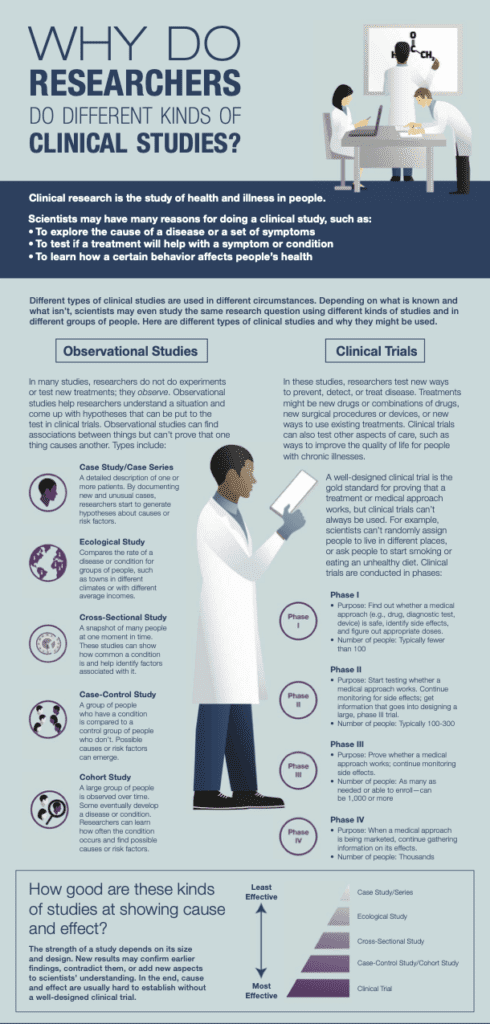There are two main types of clinical research
- Observational studies, also called natural history studies, collect health information to understand how a disease progresses over time, or how someone without the disease might fare over a similar time period.
- Clinical studies or trials test new treatments (i.e., new drugs, surgical procedures, devices, behavioral treatments, or even the role of caregivers and support groups) for diseases or new ways to diagnose disease.
Who participates?
Every person who chooses to participate in clinical research does so for their own reasons. Some of the main reasons people participate are:
- The treatments they have tried for their health problem did not work.
- There is no treatment for their health problem, and, by being part of a clinical trial, they may learn about new treatments before they are widely available.
- They prefer the comprehensive health care they may receive during the study.
- While they are healthy, there may be a disease that is common in their family, and they want to help find ways to prevent it.
- They feel participating offers a way to play an active role in their own health care.
- They want to help researchers learn more about certain health problems.
Regardless of your reason and regardless of the outcome of the study, your participation helps move science forward. Without your participation we could not discover new treatments or find ways to better help future generations.

You can participate in clinical trials in different ways.
You can join a study directly and participate in real time or you can give permission to your health care provider to include your data or samples (blood or tissue) in their research.
While each study is different, there are strict regulations about how they should be conducted, and many of the steps are the same.
- A member of the study team will explain the trial to you in detail and they will give you information to read at home if you are not yet ready to make a decision about participating.
- The study team will ask you questions to better understand if you will be eligible for the study, e.g. are you the right age, do you have the time participate?
- You can ask the study team any questions you have and once you feel all of your questions are answered and you agree to participate, you will sign a form documenting what was explained to you about the study. This is called an informed consent and it also has information about who to contact if you have questions later or if you change your mind about participating, as well as information about how the study team is protecting your data privacy rights.
- You will then be screened to make sure you qualify for the trial.
- From here, the next step are determined by the study design.
- In your first visit, which may be in the clinic or at home, the researchers conduct tests to record a baseline of your health before you take any study treatment. These tests might include a physical exam, a memory test, doing a blood draw (e.g. for cholesterol levels), or having you fill out behavioral scales.
- You are randomly assigned to a group that receives the treatment being tested or to the control group.
- You follow the trial procedures, which might include repeating some of the tests done at the first visit, and report any issues or concerns to researchers.
- The study team, who does not know which group you are in, keeps detailed records of how your health has changed, if at all, as well as any side effects you report.
- Regardless of the study type you participate in, you will continue to see your regular physician for usual health care throughout the study.
Clinical Trial Participation Opportunities
There are many different ways to find out about clinical research opportunities that might be of interest to you. Many doctors offices have brochures or advertisements about studies they are conducting or someone in their practice or hospital are conducting. A local study site might advertise on the radio or on the internet about their study. The sponsor of a study may have a website dedicated to informing people about the study. These websites may allow you to see if there is a study site near you.
Many patient advocacy groups also list available clinical studies on their websites. And finally, as all clinical studies of new treatments are required to be listed on a national registry, you can also search for your area of interest and “recruiting” or “not yet recruiting” at ClinicalTrials.gov.
Cohen Veterans Bioscience has several studies that are ongoing or about to start that you may be interested in learning more about.
The NNL is an ongoing study that is enrolling healthy volunteers to have a series of brain MRI scans taken in a single day to help build an understanding of what normal MRIs look like at different ages and in different sexes. This imaging reference library could be used to simply and objectively diagnose conditions like TBI and PTSD because having a library of normal brain scans can help define what is different in MRIs taken from people with PTSD or TBI.
The study is being conducted at three sites, the University of Virginia, the University of Utah, and Baylor College of Medicine.
40Winks is a CVB-sponsored study that is helping us build a platform for conducting trials virtually. Participants will be screened and enrolled through the study web portal and, if they qualify, will receive two wearable and home sensor devices in the mail to use for two weeks. During this time, we will research if this approach and method can be used to measure people’s health in their home environment, without having to travel to a study site.
40Winks is now enrolling eligible study participants; learn more at the 40Winks website.
This study will evaluate whether sleep data from a wearable device can provide more accurate information about the patient’s sleep habits and patterns than the patient’s memory recall. It will also evaluate whether having this information improves the clinician-patient CBTi session for better treatment outcomes.
This study will begin in early 2023 and link to the enrollment site will be added at that time.
This study is for both health volunteers interested in clinical research and those with PTSD, mTBI or concussion, depression, or insomnia who are looking for the next opportunity to join a new treatment trial or want to contribute their data to gain a better understanding of their condition.
The registry will being asking for volunteers in mid-2023 and an active link for more information will be added here at that time.

Get More Information
Interested in joining on of our studies or getting more information? Feel free to reach out to us today.

















